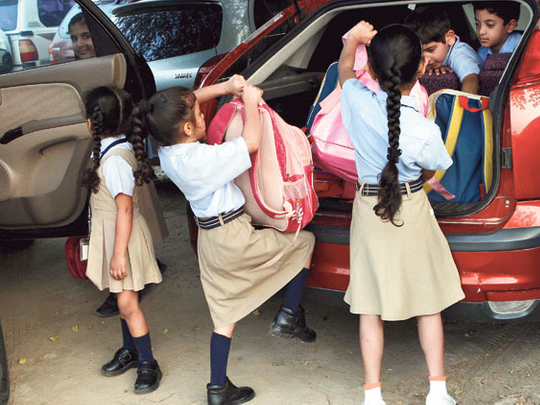
Dubai: Small children sporting bags bigger than themselves are no strange sight nowadays, with many parents confessing the bags are too heavy even for adults.
With the lack of any governmental guidelines on the weight of school bags, the daily load children carry differs widely. "Lately I noticed that my son is stooping and he constantly complains of back pain," one parent said.
The boy insists on packing all his books, despite the school having locker facilities, the worried mother said, adding it was unreasonable for schools to ban trolley bags.
"Since trolley bags were recently banned in my child's school, children have to walk around carrying about 7-8kgs on their backs every day," another parent, said. "The distance that they have to walk from the bus to the school building is also considerable," she added.
Concerned authorities need to develop ways to help reduce the strain, according to Ann Mary, a doctor and a mother-of-two. Many children, as young as ten, show symptoms of back problems, which is a worrying trend, she said. "Hauling around heavy bags may not be the only cause, but it is definitely contributing to it," said Mary.
Message to children
Mother of a fifth grader, Lilian Philip, said books should be written for a particular term so that they are lighter. "Also, the message is absorbed better if it is from the teacher. They should emphasise the importance of bringing only those books which are required for the day," she said.
Although trolley bags seem like a better option as compared to backpacks, recent research suggests that trolley bags cause damaging spinal rotation. Many experts favour a well-packed, properly fitted backpack which weighs within the recommended limit over trolley bags.
However, judging by the concerns raised by parents, a vast majority of pupils in UAE schools carry well over the recommended weight limit of ten per cent of their body weight. This is why many parents are angry with schools which have banned trolley bags in their campuses. But the schools have a different story to tell.
Al Salam Private School in Dubai introduced a no trolley bag policy last year.
"We repeatedly instructed children to only carry home books they need for homework or study for one evening. However, day after day, we saw their bags full," said Sue Johnston, principal of the school. "There is simply no need for children to carry all their books back and forth."
"Heavy trolley bags are causing children to twist their backs for extended periods with their shoulder and arm stretched behind them just to manage the bags. This potentially causes serious skeletal and shoulder problems," she said.
‘Wrong weight'
"If a child cannot manage their own school bag, it is the wrong style or weight for them." Parents, drivers and home helpers should not feel they need to carry bags for the children, Johnston said. Children move too quickly when coming down the stairs and the weight of their bags sometimes causes them to lose control of the bag, sending it tumbling down the stairs, jeopardising the safety of others, while some use their trolley bags as a weapon, intentionally knocking down others, she added.
The Abu Dhabi Indian School (ADIS) prohibited the use of trolley bags for pupils above grade six, from October 2011, creating resentment among many parents. Vijay K. Mathu, ADIS principal said: "A major problem with the trolley bag is that it is an excuse for children to lug unnecessary books every day." Parental concerns are sometimes exaggerated. "For instance, one parent said her child's bag weighs 10kg and we weighed it to find it to be 6.5kg."
Way forward: finding solutions
Parents and schools must work together. The Knowledge and Human Development Authority Dubai (KHDA) said parents and schools must work together to find a solution.
"Although currently there are no guidelines on the specifications for the school bags, the health and safety of students is our primary concern at KHDA," Mohammad Darwish, chief of the Regulations and Compliance Commission, KHDA, said. "Schools and parents must work together to find solutions that are practical, effective and safe for students."











